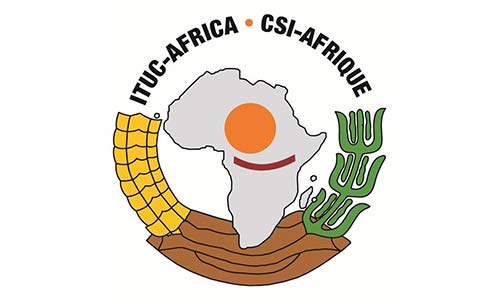In 2023, ITUC-Africa and the Labour Research Service hosted the first continental capacity-building engagement for trade union leaders and activists. The goal was to empower individuals to become informed advocates and educators on trade and investment matters, particularly regarding the African Continental Free Trade Area (AfCFTA). One of the key commitments made by ITUC-Africa affiliates during this engagement was to focus on the informal economy and enhance the participation of women and youth in trade by creating a pool of trade union experts at various levels.
ITUC-Africa organised a follow-up workshop in Benin in August 2024 to build on the momentum. The workshop, Empowering Women and Youth in Trade: A Trainer of Trainee Approach to Understanding the AfCFTA Agreement on Women and Youth in Trade, equipped participants with the knowledge, tools, and strategies necessary to empower actors in formal and informal cross-border trade.

“The success of the AfCFTA will not be measured solely by the volume of trade it facilitates, but by how well it enhances the lives of all Africans, particularly those who have been at the margins of economic opportunities. By deepening your understanding of the AfCFTA and its provisions, you will be in a better position to share information within your communities and networks, thereby multiplying the number of future trainers”
– Joel Akhator Odigie, Secretary General, ITUC-Africa.
Understanding the AfCFTA: Key takeaways for trade unions
Dr Hod Anyigba, Executive Director of the Africa Labour Research and Education Institute (ALREI), outlined the primary objectives of the AfCFTA: promote intra-trade, industrialisation, and value-added production to help spur economic growth. Gender mainstreaming is essential to ensure inclusive benefits under the AfCFTA.
Essential resource: Trade Unions and Trade: A Guide to the African Continental Trade Agreement
How well do participants know the AfCFTA agreement?

AfCFTA challenges include, diverse economic structures, inadequate infrastructure, persistent trade barriers and protectionist measures, political and security instability, and capacity and coordination issues.
Actions for trade unions
- Advocate for inclusive trade policies for women and youth in trade to benefit under the AfCFTA.
- Educate stakeholders on the impact and opportunities of the AfCFTA.
- Enhance capacity to help businesses, particularly SMEs, engage effectively in AfCFTA.
- Promote collaboration between governments, businesses, and civil society.
- Track the economic impact of AfCFTA in certain areas.
AfCFTA Protocol on Women and Youth in Trade: Gaps and Recommendations
The Agreement establishing the AfCFTA says a ‘protocol‘ is an attached instrument that forms an integral part of the Agreement.
The Protocol on Women and Youth in Trade addresses the specific challenges faced by women and youth in trade.
“Cross-border trade presents unique challenges for women, from lack of competitiveness and participation in regional value chains to gender-based violence and harassment. We advocate for tailored solutions for engaging and connecting women and youth in trade to opportunities, resources and capacities,”
– Marie Thiam Soumaré, Continental President of the African Women Network of AfCFTA.
However, several gaps and issues in the women and youth protocol require the attention of unions, including:
- Premature liberalising of products in sectors where women and youth are dominant but unable to compete can be counterproductive. Advocate for adequate support for women and youth in trade.
- The lack of a simplified trade regime hinders the participation of micro and informal cross-border trading.
- Trade union’s demands include the inclusion of labour provisions throughout the AfCFTA agreement and the promotion of ILO’s Convention 190 on ending gender-based violence and harassment in the world of work.
- Ensuring that women and youth engaged in small-scale and informal cross-border trade can benefit from the AfCFTA requires freedom of movement across borders.
Formalising the informal economy
The debate about formalising the informal economy is ongoing. In August, the African Union adopted the continent’s first Social and Solidarity Economy strategy, a 10-year plan to create a supportive environment for equitable and sustainable development. This strategy acknowledges the significant role of informal economy organisations.
“The informal economy represents the next significant area for union engagement. We require innovative organising and partnership strategies for the informal sector,“
– Joel Akhator Odigie
Steps for ensuring an inclusive AfCFTA

Effective advocacy communication
Effective trade union advocacy under the AfCFTA requires understanding workers’ perspectives and engaging them across diverse sectors. ALREI’s study shows that while awareness of the AfCFTA exists, significant knowledge gaps remain, particularly in Central Africa. Unions need to develop effective campaign strategies:
Map audiences and tailor content to their preferences, behaviours, and preferred platforms. This involves understanding demographics, interests, and the most effective ways to engage them.
Use project management tools to organise and schedule content, ensuring regular updates with diverse formats like tweets, videos, and podcasts to maintain audience interest and engagement.
Allocate a budget to boost certain social media posts to expand reach and visibility.
Use consistent hashtags across all platforms to make it easier for audiences to find and follow campaigns.
Have a media outreach strategy to secure coverage in mainstream outlets and keep the campaign in the public discourse.
Evaluate campaigns to measure success and improve campaign strategies.
Invest in reliable language translation tools to effectively communicate across the language divide.
Share campaign toolkits to maximise outreach and impact through a cohesive and synchronised effort.
Use blended learning – offline and online – to cater to different learning preferences.
Effective training techniques

“The idea is to move beyond traditional training methods. We want you to leave not only with knowledge but with the confidence to apply that knowledge effectively, ”
– Dr Hod Anyigba
Preparation: Understand your audience’s needs, expectations, and knowledge levels to tailor content effectively. Plan the training with clear topics, objectives, and outcomes for a logical flow.
Presentation skills: Ensure clarity, engagement, and interaction. Keep content concise, use visuals, storytelling, and real-life examples, and manage time effectively.
Engagement: Use icebreakers, group work, simulations, role-playing, polls, and quizzes to maintain energy and gauge comprehension.
Post-training support: Provide follow-up resources, Q&A sessions, and assessments to reinforce learning and gather feedback for improvement.
Flexibility and technology: Incorporate flexibility, use technology, and have a strong follow-up plan to ensure the effective application of knowledge.
Expert insight: Exporting under AfCFTA
Charles Féridjimi Cossy, President of the Growth and Development Commission of the National Confederation of Employers of Benin (CONEB), shared practical guidance on exporting under the AfCFTA. Drawing from his experience exporting fresh pineapples and juice from Benin to neighbouring countries, Cossy shared some key strategies for exporters.
- Do market research.
- Obtain necessary certifications, like the Protected Geographical Indication (PGI) for specialty products.
- Avoid common errors and strengthen knowledge of export/import processes and the AfCFTA rules. Cossy shared his experience dealing with challenges such as complex rules of origin and administrative procedures, which can be daunting for new exporters.
- Learn to navigate intra-trade challenges like corruption, bureaucratic hurdles at border controls, and security concerns.
- Leverage local growth. With around 23,000 new businesses created annually, many of which are owned by women and youth, there is a clear potential for growth in Benin’s export sector.
- Ensure compliance with environmental regulations.
- Share information swiftly to overcome border challenges.
Participants engaged in practical exercises on exporting goods under AfCFTA, using examples like exporting mushrooms from Ghana to Malawi, covering key steps such as confirming AfCFTA membership, understanding trade provisions, and complying with rules of origin.
Essential resource: A Guide to the AfCFTA Protocol on Trade in Goods
Expert insight: Exporting under AfCFTA
Boro Djafalou, a Customs Inspector and Master Trainer in rules of origin with WCO/JICA, provided a detailed overview of the critical role of customs administration in facilitating the implementation of the AfCFTA. He shared the logistical and regulatory framework needed to optimise trade under AfCFTA, particularly for Least-Developed Countries.
Djafalou highlighted the importance of capacity-building, infrastructure investment, and modernising customs systems to facilitate smoother trade. He also cautioned on trade imbalances and the marginalisation of smaller economies.
RELATED ARTICLES
- Addressing the gender gap in trade – Interview with Marie Thiam Soumaré, Continental President of the African Women Network of AfCFTA.
- How cross-border trade can thrive under the AfCFTA – Interview with Anthony Kwache, President of Kenya National Alliance of Street Vendors and Informal Traders.
- Trade union recommendations to ensure decent work for women and youth in AfCFTA
Nelly Nyagah
Nelly Nyagah is the Head of Communications at Labour Research Service.




